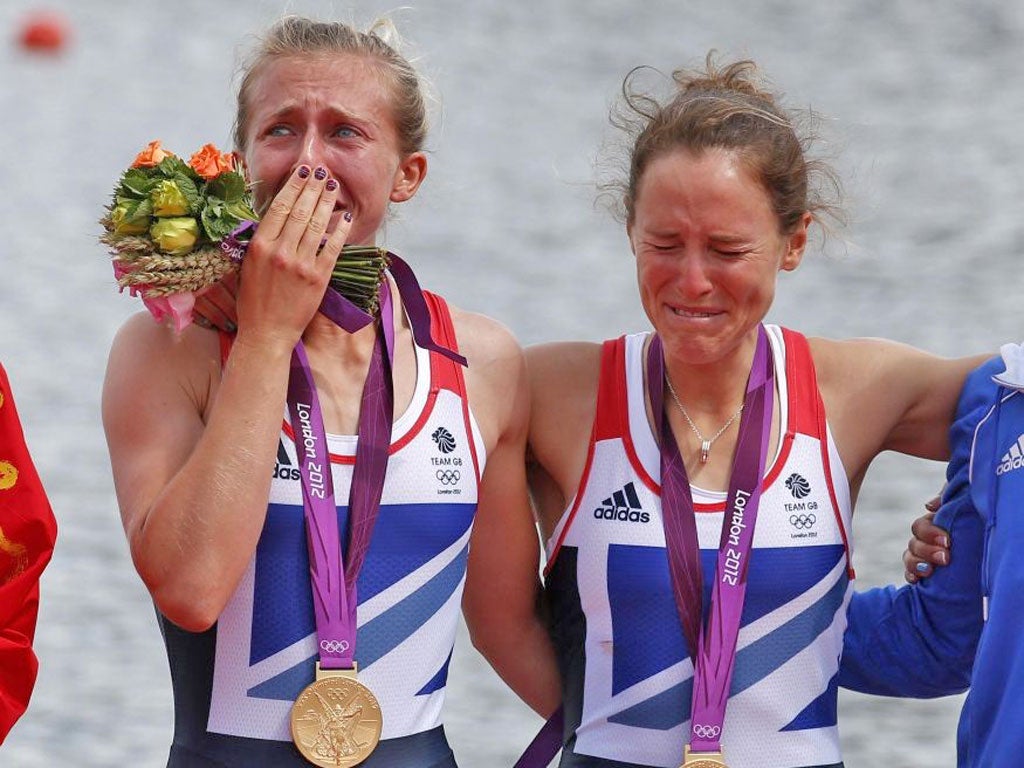Golden GB rowers set such high standards that silver is never enough
Dazzling success at Eton Dorney down to a mentality where there is no place for second-best

For all the gold and glory that went Britain's way over four memorable days of finals at Eton, it is the story of two boats that did not cross the line first that demonstrates why this is a sport that has achieved such a dazzling level of success, not only at this Games but throughout the last 20 years.
There is a culture of winning that is bred strong across the men, and now women, who row for Great Britain. For the men's eight, the giants of the lake, it was gold or bust – there was no difference between silver or bronze. They readily sacrificed winning silver to try to win gold, taking on a German crew that had dominated global waters for four years.
Then on the final day of the regatta came Zac Purchase and Mark Hunter, the defending champions in the lightweight sculls.
The pair had endured a troubled preparation through injury and lack of form, then their seat broke in the final but still it was gold or bust. Silver was no consolation whatsoever.
It is an attitude that, of course, is inherited from the likes of Sir Steve Redgrave and Sir Matthew Pinsent, and one carried on from that era by Jürgen Gröbler, who seems set to continue to the Rio Games in 2016.
It is ingrained in the likes of the distraught Hunter and Purchase, the gold-winning four, Andy Triggs Hodge, Pete Reed, Tom James and Alex Gregory, and across the women's crews too.
"We knew right from the beginning that we would race for gold and not settle for silver," said Gröbler of the four. The former East German coach has now delivered 10 successive gold medal-winning crews. That continuity is key too. This is a set-up that is structured for success. It is well-funded: £27.3m is more than any other sport receives. UK Sport will determine the levels of funding through to Rio 2016 in December.
Ahead of the Games all sports have already submitted detailed plans for their next Olympic campaign. Those will be assessed together with the results attained in London and the money handed out – rowing will be at the front of the queue again.
Their record in Eton was Britain's best at an Olympic Games. Thirteen crews were entered. Every single one reached the final, four of them took gold, two silver, three bronze, as well as three in fifth place and one in six. "GB rowing produces when it matters most," was Pinsent's verdict. It was a notably historic regatta for the women's crews. No British women had ever won Olympic gold before this Games, now they have three. It was to Helen Glover and Heather Stanning, the partnership of teacher and soldier, that Britain's first gold medal of the Games was delivered. There was never any doubt that the pair would do it. They were one of Britain's banker gold medals, as were Katherine Grainger and Anna Watkins, although no gold will be as well received or deserved.
Sophie Hosking and Kat Copeland's win, on the other hand, came out of the blue on pre-Games form, but by then the tide was running in Britain's favour, a red, white and blue wave of success. Redgrave may have been overtaken as Britain's most successful Olympian, but his sport remains very much the country's Olympic flagship. The total of nine medals left Britain top of the table, New Zealand were second with five, but barely had the ink dried on it than thoughts among the coaching staff were starting to shift ahead again.
"The Rio Olympiad has already started," said Paul Thompson, the women's and lightweight coach, "and we need to push them forward. It's tough to follow, but that's our challenge."
Join our commenting forum
Join thought-provoking conversations, follow other Independent readers and see their replies
Comments